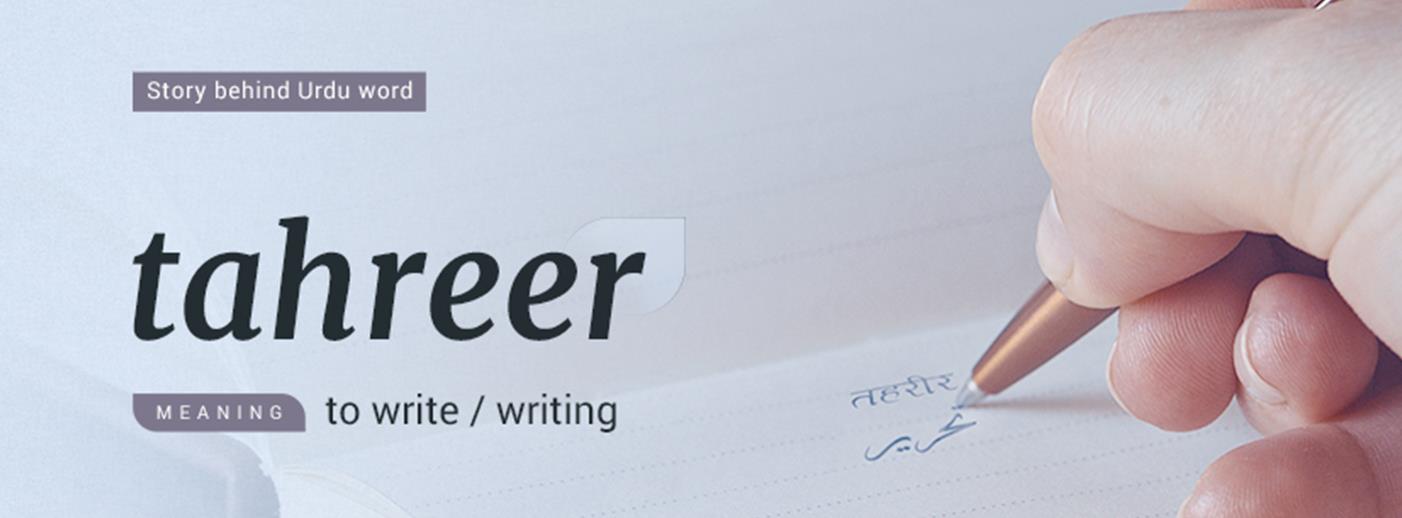अधिक खोजे गए शब्द
सहेजे गए शब्द
खिस्यानी बिल्ली खम्बा नोचे
जिसे क्रोध आ रहा हो वह अपनी खीझ या क्रोध दूसरों पर उतारता है, लाचारी में आदमी दूसरों पर क्रोध करता है, लज्जित व्यक्ति दूसरों पर अपनी लज्जा उतारता है, निर्बल की खीझ
कोशिश
कोई काम करने के लिए विशेष रूप से किया जानेवाला प्रयत्न, मेहनत, दौड़ धूप, प्रयत्न, प्रयास, चेष्टा, उद्योग, श्रम, उद्यम, उपाय, परिश्रम
आठ बार नौ त्योहार
सुख-सुविधा और आराम का शौक़ या लगन ऐसा बढ़ा हुआ है कि युग और समय उसको अल्प व्यय नहीं करने देता
चमनिस्तान
ऐसा बाग़ जहाँ फूल ही फूल हों, ऐसी जगह जहाँ दूर तक फूल ही फूल और हरा भरा नज़र आए, वाटिका, चमन, बाग़
दादरा
संगीत में एक प्रकार का चलता गाना (पक्के या शास्त्रीय गानों से भिन्न), एक प्रकार का गान, एक ताल
Think You Know All About the Word Tahreer? Think Again!

naqsh fariyaadi hai kis kii shoKHi-e-tahrir ka
kaagzii hai pairahan har paikar-e-tasvir kaa
For favors from whose playful hand, does the word aspire
Each one's an abject supplicant in paper-like attire
Most of us know the couplet above; the first couplet in Ghalib’s Diwan, agree?
“Tahreer” means ‘to write’, or ‘a writing’, and, in this couplet, it has been used in its everyday meaning having a pivotal place.
But what many of us don’t know is that originally, the word was coined for an entirely different purpose, and was used in a completely different sense.
The word is derived from the Arabic root Hurr (H-r-r), which means a free man; liberal; a slave set free. Additionally, it also came to be used in the sense of any bird that was released from its cage. It is from the same word that we derived the word Hurriyat, meaning a drive or movement to set free. You must have heard Hurriyat Neta/Leaders, often taken as separatists.
So, it is pretty clear that the idea of “freedom” is closely related to “Tahreer”. Wonder what it is that gave the word its prevalent meaning?
Here is the gist, in primeval times, it was customary in Arabia that when a slave was set free, a written proof was handed over to him, that he was now free. This written document was known as “Tahreer”. Therefore, the actual meaning of the word, one which is still prevalent in Arabic, was to set someone free, to release someone. Gradually though, the word became synonymous to writing, and that’s how everyone has been using it for ages.
Well now that you know, the “Tahreer” in Ghalib’s couplet comes out more like a fettered will, instead of free will, no?
Delete 44 saved words?
क्या आप वास्तव में इन प्रविष्टियों को हटा रहे हैं? इन्हें पुन: पूर्ववत् करना संभव नहीं होगा





